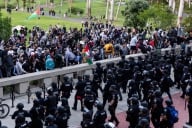You have /5 articles left.
Sign up for a free account or log in.
A very sad way to make my point. Just one day after I asked whether “loyalty,” and the silence and internal self-protection it breeds, got Penn State into trouble, former Penn State President Graham Spanier was indicted. In an eerie echo of my description of the dangers of loyalty, the findings related to the indictment reflect what Linda Kelly, Pennsylvania's attorney general, called a “conspiracy of silence” in which Spanier and others “turned a blind eye” to a series of predatory acts -- a cover up that resulted in “staggering” “actual harm.”
The decision to keep everything internal and private, not to disturb the veneer of respectability (even after having a talk with Sandusky, there was no effort to monitor or enforce or remedy the situation) has turned out to have very costly consequences. There are multiple felony charges, and they carry the potential for prison if Spanier is found guilty. Spanier is claimed to have lied under oath; to have willfully failed to disclose information and documents; to have failed in his duty as president (his position was seen as meaningful) to report what he knew to authorities, in the process showing a “willful disregard for the safety and well-being of minor children on the Penn State Campus.”
And for what? According to the findings, to protect against “embarrassment” and the potential to “damage and harm Penn State.” But all the exhortations of integrity and innocence and the efforts to control the story of a terrible wrong have ended up doing just the opposite: creating huge shame and yet-to-be-calculated harm. Here is the answer to that old question, “What price loyalty?”
And therein lies the paradox of loyalty. The findings clearly suggest that justice was traded off here for self-protection. Surely most people at Penn State, and in higher education, would not actively choose that. Will people be angry enough at last, or alert enough to its dangers, to start talking about whether loyalty belongs to people and institutions or to ideas and values? Or will they continue to be silent?
In asking this I can’t help but think about Mike McQueary, whose role I’ve wondered about from the start. When he found Sandusky in the shower assaulting a child, he did not call the police, but went to his father, who in consultation with a doctor of all things suggested he go to Paterno, who told him he “did the right thing” in coming to him. This sent shivers up my spine, and I encourage anyone who ever hears this “right thing to come to me” line to pay attention. Did that choice to go to Paterno put the chain of concealment into motion? Was McQueary, then a graduate student and now a coach at the institution, used -- rewarded -- for loyalty, perhaps without realizing it? It is all too easy to become embroiled in a culture of silence. We all need to be alert.





